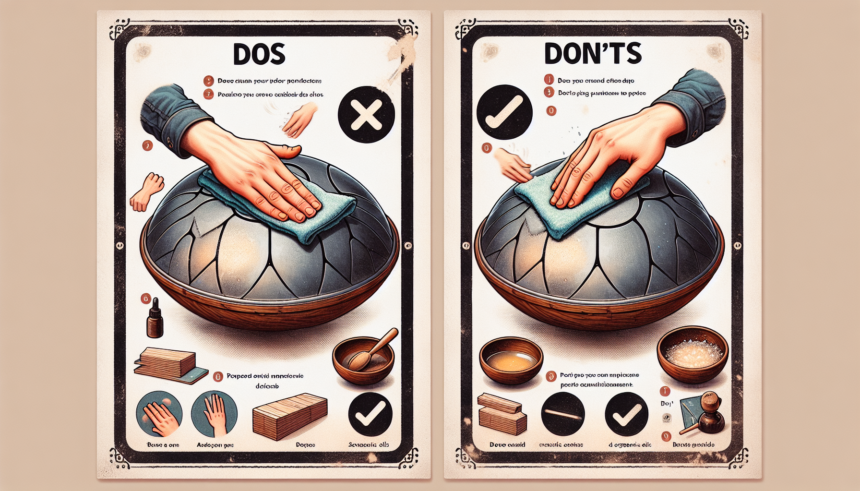Do’s for Handpan Surface Maintenance
A handpan is a delicate instrument, and its maintenance is crucial to ensuring its longevity and sound quality. Here are several practices you should adopt to keep your handpan in top condition:
- **Clean It Regularly**: A gentle wipe-down with a microfiber cloth can remove dust and moisture. For a deeper clean, use a light mist of distilled water and wipe gently.
- **Use Protective Oils**: Apply a thin layer of protective oil, such as frog lube or Phoenix oil, to prevent rust and corrosion. Be sure to wipe off any excess oil.
- **Store It Properly**: When not in use, store your handpan in a dry, cool place. Use a handpan bag or case for extra protection.
- **Handle With Care**: Always use clean hands when playing. Oils and dirt from your skin can affect the instrument’s surface over time.
- **Tune It Annually**: An annual tuning by a professional ensures that your handpan maintains its sonic integrity.
- **Use Desiccant Packs**: Adding desiccant packs to your handpan case can help absorb moisture, further reducing the risk of rust.
Don’ts for Handpan Surface Maintenance
Equally important as knowing what to do is understanding what not to do when maintaining your handpan. Here are some common mistakes to avoid:
- **Don’t Use Harsh Chemicals**: Avoid using cleaning agents with strong chemicals as they can damage the surface and affect the instrumental tone.
- **Don’t Over-Polish**: Over-polishing can lead to a buildup of product, which can affect the sound and appearance of your handpan. A little goes a long way.
- **Don’t Store In Humid Areas**: Humidity can cause rust and corrosion. Avoid storing your handpan in basements or near bathrooms.
- **Don’t Play With Dirty Hands**: Oils, grime, and dirt from your hands can tarnish the handpan’s surface and eventually cause rust spots.
- **Don’t Leave It Exposed To Extreme Temperatures**: Temperature fluctuations can affect the tuning and the metal’s integrity. Avoid leaving your handpan in a car, especially in hot or cold weather.
- **Don’t Neglect Small Issues**: Small issues like minor rust spots or a bit of tarnish can escalate into larger problems if not addressed promptly. Regular checks can prevent this.
Conclusion
Maintaining a handpan requires a bit of effort and attention but ensures longevity and optimal sound quality. Regular cleaning, proper storage, and timely professional tuning can keep your handpan in excellent condition. Avoiding common mistakes like using harsh chemicals or exposing your instrument to extreme conditions can prevent needless damage. In essence, treating your handpan with care and respect allows this beautiful instrument to provide you with serene tones for years to come.
FAQs
- **How often should I oil my handpan?**
It’s generally recommended to oil your handpan every 1-2 months, depending on how often you play and the conditions in which you store it.
- **Can I use regular household cleaners on my handpan?**
No, household cleaners often contain chemicals that can damage the surface. Stick to mild, handpan-specific products or distilled water for cleaning.
- **What should I do if my handpan starts to rust?**
Small rust spots can often be treated with a gentle scrub using a fine-grade sandpaper and reapplication of protective oil. For extensive rust, consult a professional.
- **Is it okay to play my handpan outside?**
Playing outside is generally safe as long as you avoid direct sunlight, rain, and excessively humid conditions. Always wipe down and store your handpan properly after outdoor use.
- **Do I really need a handpan case?**
Yes, a good handpan case provides vital protection against physical damage and environmental factors like humidity and temperature changes.





